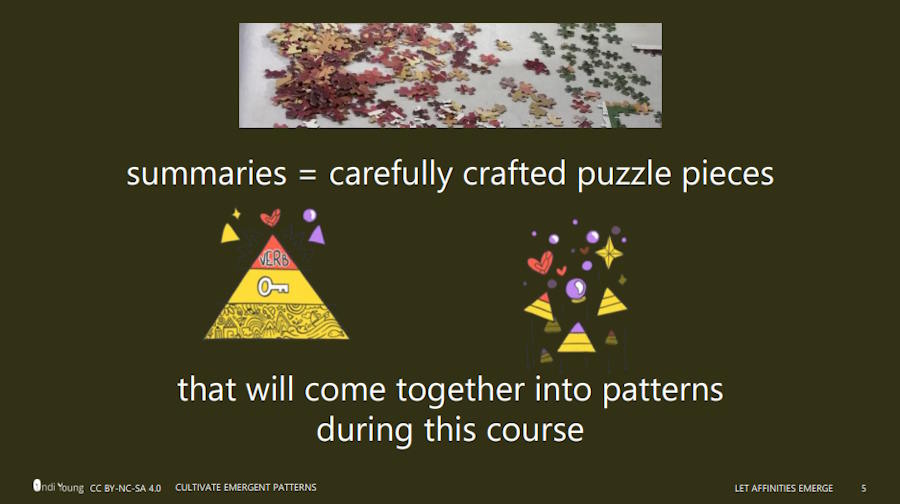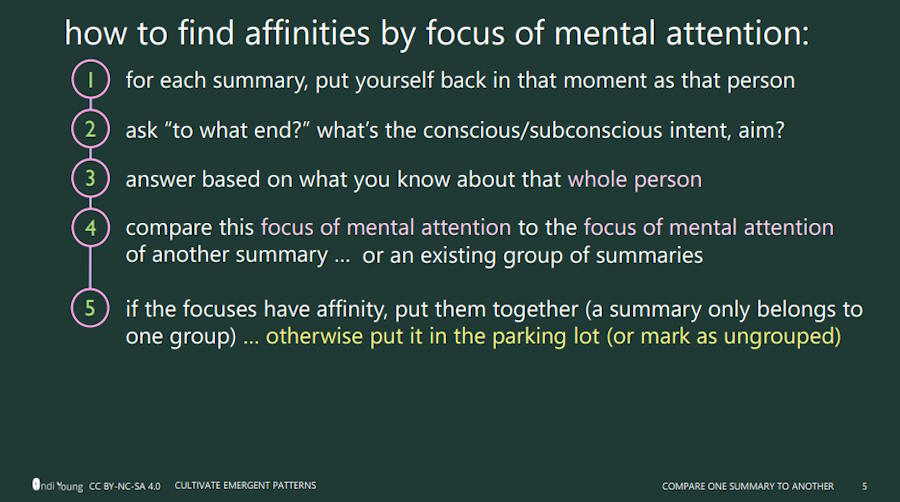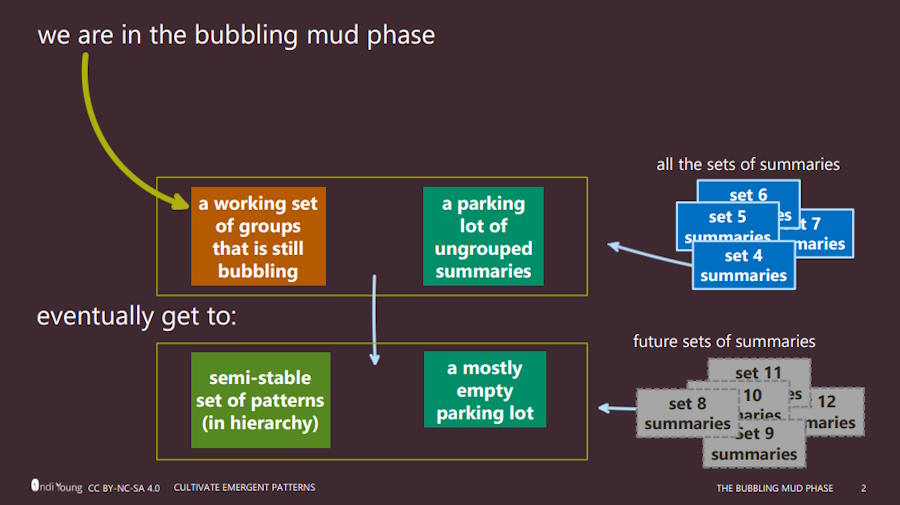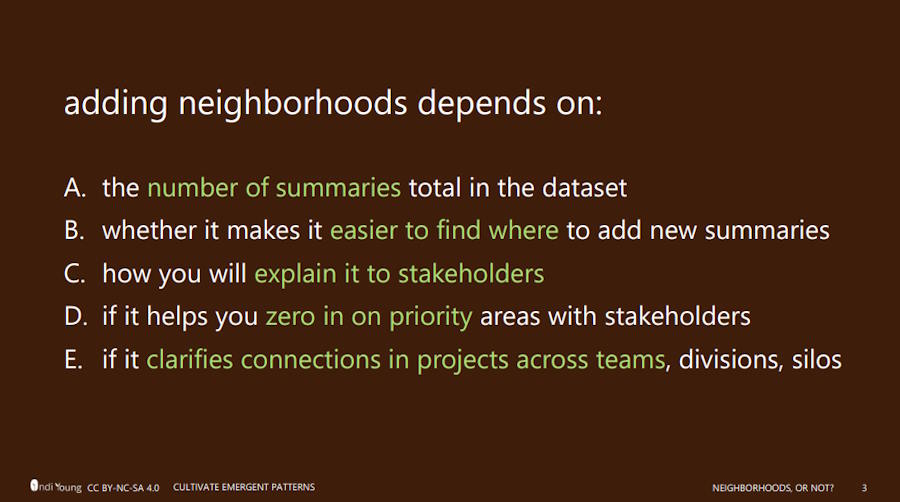Making mmSkylines Part 2: Emergent Patterns
(Please take Part 1 before starting this course.) Typical affinity grouping involves intuitive understanding of how concepts fit together. Cognitive bias creeps in. This course covers an emergent affinity technique using people’s focus of mental attention. It’s an actionable praxis approach, with depth and structure similar to thematic analysis or grounded theory.
Self-paced course
Closed captions
Last updated August 2025
Join Indi’s Slack community
6 month access
About the course
The mental model skyline starts to emerge midway through this second step, where the patterns fit together across concepts.
The goal of research is to see approaches and ways of thinking that are not our own. To do this, we need a bottom-up synthesis technique, instead of a top-down one. Most affinity techniques have to do with pre-existing structures like time (e.g. before purchase, after purchase), topics that are already what the org measures, or themes that a researcher pulls from the transcripts. The themes are rarely the same, though, given two different researchers and the same transcripts.
The affinity technique of people’s Focus of Mental Attention allows two researchers to find the same patterns. It allows approaches and ways of thinking to emerge that are unexpected and welcome.
By the end of this course, you will have created a mental model skyline using example study data.
Course Sections:
Section 1 – Focus of Mental Attention
1.1 Let Affinities Emerge (Where We Want to End Up)
1.2 Why Synthesis?
1.3 What Are Affinities?
1.4 Focus of Mental Attention
1.5 What is it not?

Section 2 – Comparing Summaries & Avoiding Traps
2.1 Compare One Summary to Another
2.2 Work from the Bottom Up
2.3 Going a Little Bit Faster
2.4 Trap: Common Nouns
2.5 Trap: Sequence
2.6 Trap: Too Many Meanings
2.7 Getting Out of a Trap

Section 3: Groups, Labeling, Hierarchy
3.1 The Bubbling Mud Phase
3.2 Labeling Groups
3.3 An Opposite of the Group
3.4 Defining Group Levels
3.5 Grouping Groups
3.6 Just Keep Bubbling
3.7 Solo Summaries
3.8 Inflection Points

Section 4: Checking Your Work & Creating the Diagram
4.1 Neighborhoods, or Not?
4.2 When Is It Finished?
4.3 Making the Diagram
4.4 The Pace of Work
4.5 Working Together
4.6 Speeding It Up
4.7 Q&A: Are Patterns Affected by the First Sets Chosen?
4.8 Q&A: Can I Use Existing Data?
4.9 Q&A: How Does This Fit with Academic Theory?

Who is this for?
People who are tasked with making the mmSkyline.
This course plus Part 1 will give you a solid foundation for seeing how patterns arise from the data. It replaces the imperative to “just find affinities.” If you are an experienced researcher, these two courses are about emergent synthesis, allowing other people’s perspectives and ideas to take precedence over your own way of making sense of what was said.
The two courses give you a structure to hold ambiguity while helping patterns emerge. The courses model how to keep thinking about the stories in a rigorous way, so that a team can produce something that no one could have produced alone.
Emergent data synthesis will actually unlock some of your strategic directions.
Study this course if you are tasked with producing & maintaining the mmSkyline:
- Researcher, Quant, Qual, Mixed Methods
- Supervisor of Automated Analysis (coming soon)
- Software Engineer, Product Engineer
- Marketing
Skim the course to get a taste of what mindset and time requirements are involved, and how it is different than other affinity grouping methods:
- Product Lead, Design Lead, Content Lead
- Design Strategist
- Entrepreneur, Founder
- Ideas Person
Course Features
- 29 videos, in 4 sections
- Total video time: 13 hours
- Demos and examples (4 additional hours of video content!)
- Exercises & quizzes
- Closed captions
- Listen w/ or w/out the screen

Price levels – Part 2 Data Synthesis
SOLSTICE SALE 50% off, 20-21 June 2025
see discount codes in posts and newsletters
Click here to compare courses for your role
Testimonials
Go for it!! The material is really rich and you are able to directly use all the things you learned from this course
— anonymous, 29-Mar-2019
Great course, the small group means intimate setting in learning. Indi’s experience in both teaching and practicing just shows. If you think you “know it all” or are already good at qualitative research / problem space research, think again. :) Personally feel I have gained alot of wisdom not…
— Yan Huang, 10-Feb-2020
Read more
It’s the only advanced user research course you can find online. The format is very engaging. You have weekly meetings in a small group where Indi teaches new concepts through hands-on activities. The best part is the weekly course exercises, which reinforces learning and gives you a taste of how…
— Gosia, 5-Apr-2019
Read moreI wish I would have discovered these courses earlier in my career. The care put into the content is evident, and the depth and nuance is unparalleled. I would highly recommend Indi Young’s work, and her video training makes concepts she writes about come alive and easier to grasp.
— Mo Goltz, 19-Feb-2020
Indi’s course had an immediate impact on my skillset. I left the class a noticeably improved researcher!
— Josh Rosenberg, 1-Feb-2020
Even if you’ve been a ux research practitioner for long, this course will show you how to let data speak for itself and how to group findings without bias.
— Augusto Bianchi, 15-Apr-2021
Frequently Asked Questions
Q: If I have questions about the course content, will Indi answer them for me?
A: Asking a question in the Slack community will give Indi, her team, and many other Slack members a chance to see the question and respond to it.
Q: Do the recordings qualify me for Indi’s Problem Space Certification Program?
A: Not quite. You will also want to join the Live Practice series for each course. In these Live Practice meetings, you get to work on exercises together with Indi and others. This is where we discuss nuances of context and share experiences that help others prepare to conduct their own research. Live Practice meetings give you a chance to double your knowledge and demonstrate your understanding.








